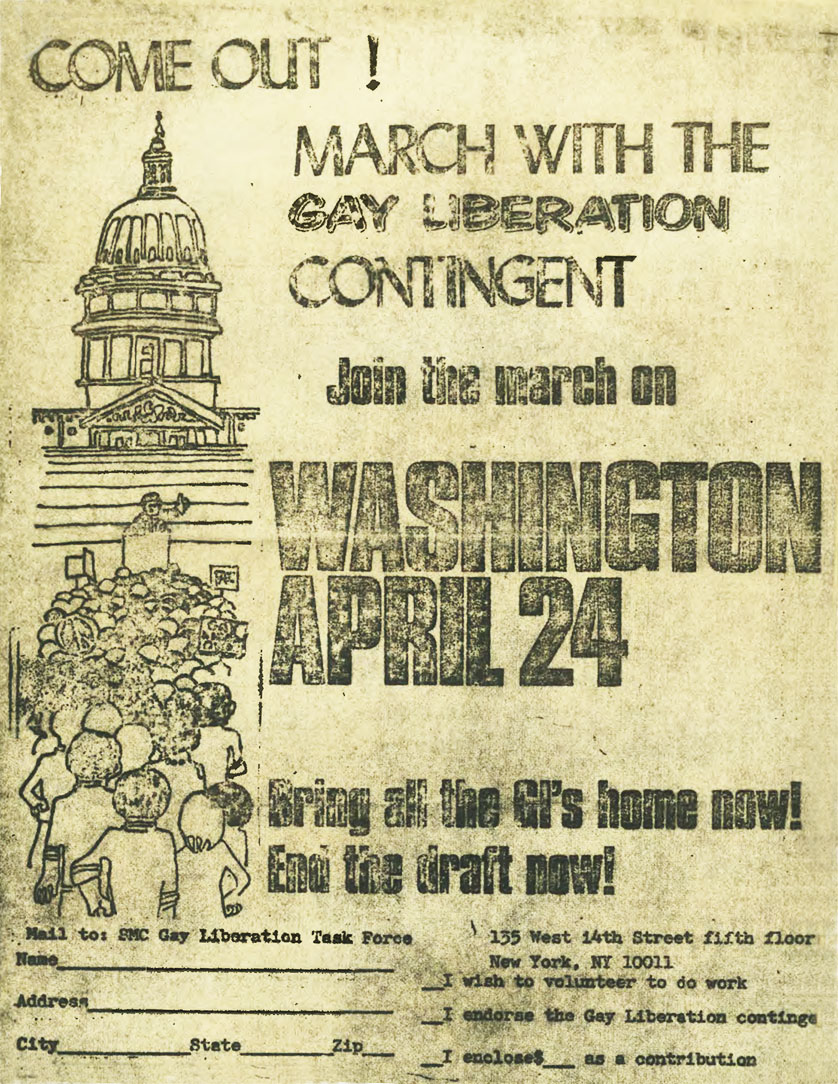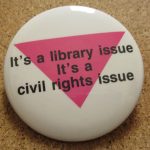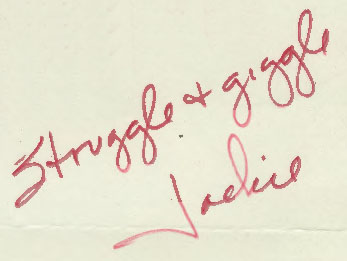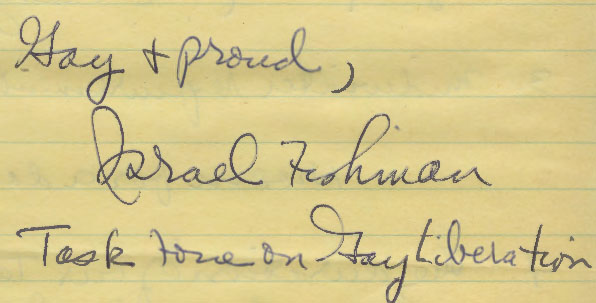
The GLBT Round Table is a group with a lot of firsts. Formed during the 1970 Annual Conference in Chicago as the “Gay Liberation Task Force,” a part of the larger Social Responsibilities Round Table, they were the first profession-based gay organization. [1] The next year, they established the first award for gay literature, now called the Stonewall Award. That same year they also published the first gay bibliography, which was a response to the lack of gay-positive books in libraries.
Their first bibliography was a single legal-sized sheet of orange paper, printed front and back, with only 48 books and pamphlets listed. It was distributed by asking interested people to send a self-addressed stamped envelope to get a free copy. [2] The bibliography was revised several times over the years, and other specific bibliographies were produced, such as ones for gay teachers, lesbians, and other groups. They later produced an even smaller bibliography than their first one, called Core Materials for Libraries, which was aimed at smaller libraries with limited budgets. [3] Their bibliographic work now lives on as the Rainbow Book List for children and teens, and the Over the Rainbow Book List for adults.

To get attention for their new group, they hosted a “Hug a Homosexual” Booth, with a line for “Men only” and “Women only” at the 1971 Annual Conference in Dallas. After crowds were drawn with still no takers, Barbara Gittings, who was then coordinator for the group, shared a kiss with Isabel Miller, winner of the first gay book award, which was filmed and photographed and generated lots of news coverage. [4]
Also in 1971, the Gay Liberation Task Force immediately came out in support of J. Michael McConnell after his job offer from the University of Minnesota Library was rescinded after he filed a marriage application with his partner. The group was also instrumental in getting the ALA to address this case. [5]

The GLBT Round Table has also worked to change the often offensive wording and classification of gay books in the Library of Congress Classification System, which is used to catalog books by the majority of libraries in America. Their first change to the LCC was the addition of Gay Liberation Movement as a heading. In 1972 the Library of Congress wrote to the group:
We have now reviewed our previous treatment of this subject, including the cataloging of the works cited in your letter, […] and have concluded that your observations on our subject heading practice in this area are justified. Since works on the gay liberation movement do not concern themselves with the origin and nature of homosexuality, but rather with the efforts of homosexuals to achieve justice, Homosexuality is far too broad a subject heading to assign to such works. Therefore, we are establishing the more specific heading Gay Liberation Movement, corresponding to the heading Women’s Liberation Movement which we established last year. [6]
The records of the GLBT Round Table provide a fascinating insight into the intersection of politics, human rights, and librarianship at a critical turning point in LGBT and American history.
For more on the influential work of the GLBT Round Table, check out their website, or the two record series held by the ALA Archives used in writing this blog post: GLBT Round Table Subject Files, Record Series 49/35/1, and the Office for Literacy and Outreach Services Subject Files, Record Series 10/6/2. Newly digitized selections from these records are available to offsite researchers by request, and the complete physical records are available to onsite visitors at the ALA Archives.

Sources:
The quote in the title of this post is from the sign off on a letter from Israel Fishman to Jackie Eubanks, dated Oct 13, 1971 regarding their work with the Gay Liberation Task Force. Found in Subject File of the Gay Lesbian Bisexual Task Force (GLBTF), Record Series 49/35/1, Box 1, Folder “Gay Liberation SRRT 1972.”
[1] TASK FORCE ON GAY LIBERATION, AMERICAN LIBRARY ASSOCIATION, August 1974. Found in the Office for Literacy and Outreach Services Subject Files, Record Series 10/6/2, Box 3, Folder “Gay Liberation Task Force, 1971-75.”
[2] A GAY BIBLIOGRAPHY, A Brief List of Materials on Homosexuality. Prepared by the TASK FORCE ON GAY LIBERATION, June 1971. Found in Subject File of the Gay Lesbian Bisexual Task Force (GLBTF), Record Series 49/35/1, Box 1, Folder “Gay Liberation SRRT 1972.”
[3] Gay Materials Core Collection List. 1980 Revision. Found in Subject File of the Gay Lesbian Bisexual Task Force (GLBTF), Record Series 49/35/1, Box 1, Folder “Gay Task Force 1980.”
[4] News article: “Librarians get to ‘Kiss a Homosexual!'” by Erika Hastings. Published in GAY, Vol. 2, Issue 56, August 2, 1971. Found in Subject File of the Gay Lesbian Bisexual Task Force (GLBTF), Record Series 49/35/1, Box 1, Folder “Gay Liberation SRRT 1972.”
[5] Press Release: AMERICAN LIBRARY ASSOCIATION VOTES TO INVESTIGATE U OF MINNESOTA. July 12, 1974. Found in the Office for Literacy and Outreach Services Subject Files, Record Series 10/6/2, Box 3, Folder “Gay Liberation Task Force, 1971-75.”
[6] Letter from C. Sumner Spalding Assistant Director for Cataloging at the Library of Congress to Stephen H. Wolf of the SRRT Task Force on Gay Liberation, Feb. 10 1972. Found in Subject File of the Gay Lesbian Bisexual Task Force (GLBTF), Record Series 49/35/1, Box 1, Folder “Gay Liberation SRRT 1972.”